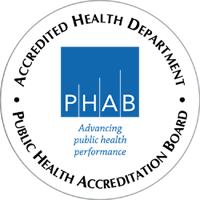If you have concerns about controlling your drug use, consider completing the Tobacco, Alcohol, Prescription medication, and other Substances Tool (TAPS). For each substance, the screening will provide a “risk level,” which indicates the likelihood of a substance use disorder. This screening does not provide a diagnosis nor does it replace assessment by a clinical professional.
Mental health and substance use disorders often happen together. Some common co-occurring mental health disorders include anxiety, depression, PTSD, bipolar (manic depression), schizophrenia and personality disorders. Many facilities that offer treatment for substance use also treat mental health disorders. If you have concerns about your mental health, consider taking an online screening by Mental Health America. These screenings do not provide a diagnosis nor do they replace assessment by a clinical professional.
KCHD employs substance use navigators, who are trained in identifying needs and connecting you to community resources. Our team is available on a walk-in basis at 140 Dameron Ave. or available from 8 a.m.-4:30 p.m. Monday-Friday at 865-215-5355.
Mental health and substance use disorders have a variety of treatment options. Some problems can be treated with medication; others with talk therapy, or a combination of both. Depending on your preference and the provider’s recommendation, you may be referred to either inpatient (residential) or outpatient treatment. Below is a list of common treatment options.
|
Level of Care |
Description |
| Outpatient Therapy | Regular office visits with a therapist or psychiatrist. |
| Intensive Outpatient Therapy (IOP) | Combination of individual and group sessions for about 3 hours a day, 3-5 days per week. |
| Detoxification | A short-term residential program to make sure that you safely come off any recent drugs. |
| Inpatient Hospitalization | A short-term residential program to manage active suicidal, manic or psychotic thoughts. |
| Residential Treatment | Longer-term stays (usually 30 to 90 days) with structured individual and group therapy sessions. |
Treatment is your choice. Many people who see a mental health professional feel like they are being told what to do. You are not required to take any of the treatment options offered to you. You can also have a personal preference for treatment that is different from what the provider recommends. Talk to your provider to make a plan you are comfortable with.
The Food and Drug Administration (FDA) acknowledges the medications below as approved options to treat alcohol and opioid (heroin, oxycodone, fentanyl, etc.) use disorders. Currently, the FDA does not acknowledge any drugs for the treatment of meth or cocaine, but therapy has been effective. These medications have several brand names, but only the most common ones are listed below. A mix of medication and therapy is referred to as Medication Assisted Treatment (MAT).
|
Medication |
Brand Name |
Treatment For |
Description |
| Acamprosate | Campral (Oral) | Alcohol | Lowers cravings |
| Disulfiram | Antabuse (Oral) | Alcohol | Causes nausea when drinking |
| Naltrexone | Vivitrol (Injection), Variety of oral tablets | Alcohol/Opioids | Blocks the effects of drinking or using opioids |
| Buprenorphine | Suboxone (Oral), Sublocade (Injection), and other oral formulations | Opioids | Lowers cravings, reduces effect of using other opioids |
| Methadone | Dolophine (Oral), Methadose (Oral) | Opioids | Lowers cravings, reduces effect of using other opioids |
It is normal to not want to talk with a clinician about your mental health or substance use. You may want to manage these concerns by yourself. You also may not be interested in decreasing drug use right now. Twelve-step groups, faith-based organizations, peer recovery specialists and harm reduction agencies are all able to support you in these goals.
Harm Reduction is when communities provide resources to people who use drugs to reduce their risk of overdose, infection and other concerns related to drug use. Carrying and providing naloxone (“Narcan”), needle exchange programs, and testing drugs for fentanyl are examples of harm reduction. You might consider getting testing for HIV and/or hepatitis C if you are using drugs with other people. Harm reduction does not ask you to seek treatment or think of drug use as a problem.
Community-based peer support is available through groups like Alcoholics and Narcotics Anonymous. Celebrate Recovery is a faith-based recovery resource for those motivated by community support through church. To learn more about these resources, visit the links below. You can also call KCHD at 865-215-5355 and request to speak to a certified peer recovery specialist.
| Alcoholics Anonymous | Visit www.aa.org/find | 12-Step Groups |
| Narcotics Anonymous | Visit www.na.org/meetingsearch | 12-Step Groups |
| Celebrate Recovery | Visit https://locator.crgroups.info | Faith-Based Recovery |



Click here to leave a comment or concern.